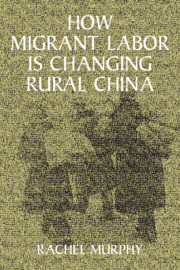Book contents
- Frontmatter
- Contents
- List of Exhibits
- Acknowledgments
- Glossary
- Poem: “I Work in the City”
- Map People's Republic of China
- Map Jiangxi Province
- Introduction
- 1 Values, Goals, and Resources
- 2 China, Jiangxi, and the Fieldwork Counties
- 3 Resource Redistribution and Inequality
- 4 Migration, Remittances, and Goals
- 5 Recruiting Returnees to Build Enterprises and Towns
- 6 The Enterprises and the Entrepreneurs
- 7 Entrepreneurs, Socioeconomic Change, and Interactions with the State
- 8 Returning Home with Heavy Hearts and Empty Pockets
- 9 Conclusion
- Notes
- Bibliography
- Index
8 - Returning Home with Heavy Hearts and Empty Pockets
Published online by Cambridge University Press: 09 November 2009
- Frontmatter
- Contents
- List of Exhibits
- Acknowledgments
- Glossary
- Poem: “I Work in the City”
- Map People's Republic of China
- Map Jiangxi Province
- Introduction
- 1 Values, Goals, and Resources
- 2 China, Jiangxi, and the Fieldwork Counties
- 3 Resource Redistribution and Inequality
- 4 Migration, Remittances, and Goals
- 5 Recruiting Returnees to Build Enterprises and Towns
- 6 The Enterprises and the Entrepreneurs
- 7 Entrepreneurs, Socioeconomic Change, and Interactions with the State
- 8 Returning Home with Heavy Hearts and Empty Pockets
- 9 Conclusion
- Notes
- Bibliography
- Index
Summary
THE previous chapters concerned the successful returnees, the entrepreneurs; however, there is another side to the story. Many migrants are compelled to return to their villages because of ill fortune in the cities or family obligations at home. Through migration, these returnees have been exposed to new values and alternative ways of living, causing some of them to form goals that are incompatible with village life. At the same time, migrants who are forced to return home often lack the resources required to attain their goals and so feel frustrated. But not all of the disruption is detrimental to village society, because the experience of living in the cities gives some returned migrants the impetus to challenge the values and social arrangements of home that they find oppressive.
Migrants who are compelled to return home often increase the complexity of the local state's work tasks, particularly in the areas of welfare, social stability, and family planning. The contract responsibility system has been accompanied by legislation making the household legally responsible for the welfare of its members. Yet as illustrated in the following discussion, this does not negate the obligation of the local state to respond when the well-being of its constituents are at stake or if the activities of the returnees threaten the integrity of national policies. Such responses include providing welfare, appealing to urban employers on behalf of injured migrants when compensation is owed to them, using publicity to urge migrants not to commit crimes in the city, and monitoring the fertility of migrant women.
- Type
- Chapter
- Information
- How Migrant Labor is Changing Rural China , pp. 196 - 215Publisher: Cambridge University PressPrint publication year: 2002



